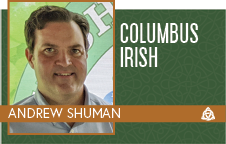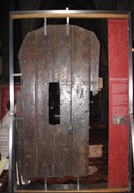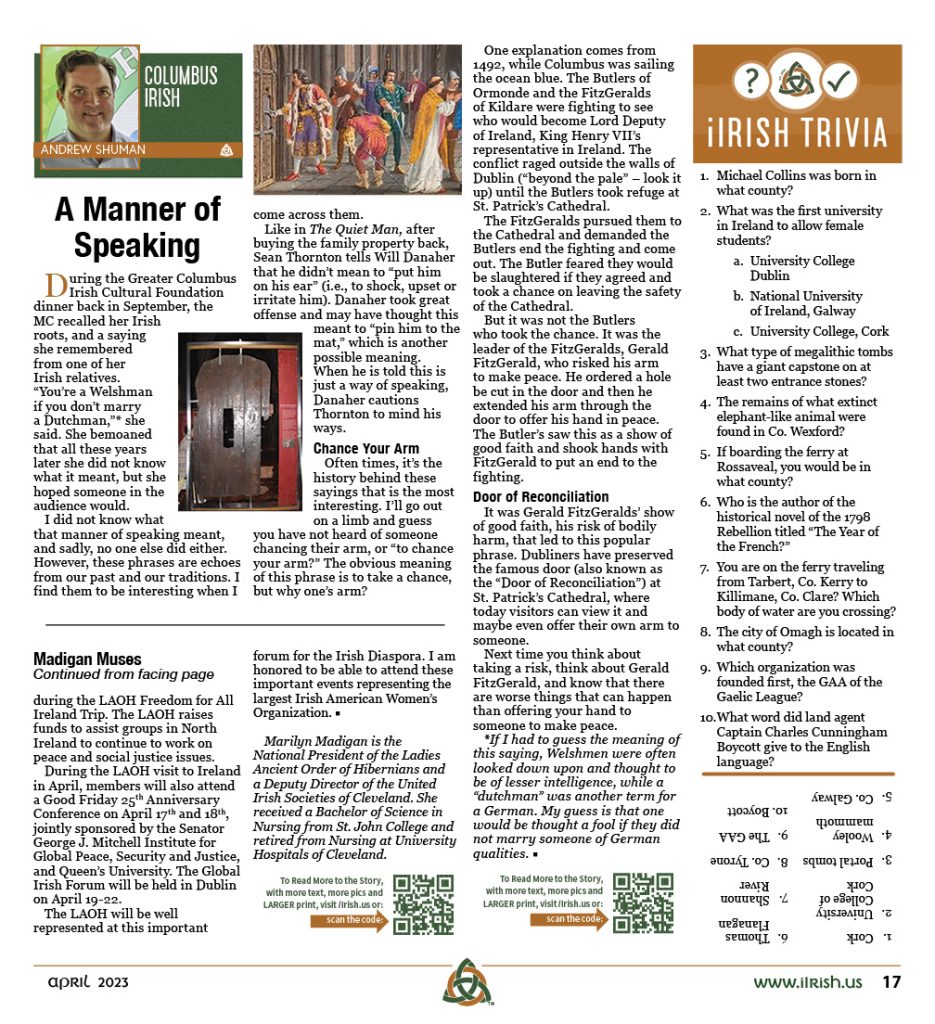

Columbus Irish: A Manner of Speaking
By Andrew Shuman
During the Greater Columbus Irish Cultural Foundation dinner back in September, the MC recalled her Irish roots, and a saying she remembered from one of her Irish relatives. “You’re a Welshman if you don’t marry a Dutchman,”* she said. She bemoaned that all these years later she did not know what it meant, but she hoped someone in the audience would.
I did not know what that manner of speaking meant, and sadly, no one else did either. However, these phrases are echoes from our past and our traditions. I find them to be interesting when I come across them.
Like in The Quiet Man, after buying the family property back, Sean Thornton tells Will Danaher that he didn’t mean to “put him on his ear” (i.e., to shock, upset or irritate him). Danaher took great offense and may have thought this meant to “pin him to the mat,” which is another possible meaning. When he is told this is just a way of speaking, Danaher cautions Thornton to mind his ways.

Chance Your Arm
Often times, it’s the history behind these sayings that is the most interesting. I’ll go out on a limb and guess you have not heard of someone chancing their arm, or “to chance your arm?” The obvious meaning of this phrase is to take a chance, but why one’s arm?
One explanation comes from 1492, while Columbus was sailing the ocean blue. The Butlers of Ormonde and the FitzGeralds of Kildare were fighting to see who would become Lord Deputy of Ireland, King Henry VII’s representative in Ireland. The conflict raged outside the walls of Dublin (“beyond the pale” – look it up) until the Butlers took refuge at St. Patrick’s Cathedral.
The FitzGeralds pursued them to the Cathedral and demanded the Butlers end the fighting and come out. The Butler feared they would be slaughtered if they agreed and took a chance on leaving the safety of the Cathedral.But it was not the Butlers who took the chance. It was the leader of the FitzGeralds, Gerald FitzGerald, who risked his arm to make peace. He ordered a hole be cut in the door and then he extended his arm through the door to offer his hand in peace. The Butler’s saw this as a show of good faith and shook hands with FitzGerald to put an end to the fighting.

Door of Reconciliation
It was Gerald FitzGeralds’ show of good faith, his risk of bodily harm, that led to this popular phrase. Dubliners have preserved the famous door (also known as the “Door of Reconciliation”) at St. Patrick’s Cathedral, where today visitors can view it and maybe even offer their own arm to someone.
Next time you think about taking a risk, think about Gerald FitzGerald, and know that there are worse things that can happen than offering your hand to someone to make peace.
*If I had to guess the meaning of this saying, Welshmen were often looked down upon and thought to be of lesser intelligence, while a “dutchman” was another term for a German. My guess is that one would be thought a fool if they did not marry someone of German qualities.


Monthly newsmagazine serving people of Irish descent from Cleveland to Clearwater. We cover the movers, shakers & music makers each and every month.
Since our 2006 inception, iIrish has donated more than $376,000 to local and national charities.
GET UPDATES ON THE SERIOUS & THE SHENANIGANS!